ESCP offered 10 opportunities between August 2015 and June 2016: 2-4 week observerships, 3-month fellowships and 6-month fellowships.
Click on a fellow's name to read their report
| Name | Country | Host Center | Fellowship Type | Dates |
|---|---|---|---|---|
| Christian Buchli | Sweden | Universitair Ziekenhuis Leuven, Belgium | Observership | December 2015 |
| Elroy Patrick Weledji | Cameroon | Kantonsspital, St. Gallen, Switzerland | Observership | November 2015 |
| Gabriele Böhm | Germany | Aarhus University Hospital, Denmark | Observership | February 2016 |
| Zhanlong Shen | China | St Mark's Hospital, UK | Observership | November 2015 |
| Edgar Furnee | The Netherlands | Aarhus University Hospital, Denmark | 3-month Fellowship | April-June 2016 |
| Jelena Petrovic | Serbia | Geneva University hospital, Switzerland | 3-month Fellowship | October-December 2015 |
| Manol Sokolov | Bulgaria | Kantonsspital, St. Gallen, Switzerland | 3-month Fellowship | January-March 2016 |
| Mia Kim | Germany | University Hospital Nantes, France | 3-month Fellowship | January-March 2016 |
| Emre Sivrikoz | Turkey | St Mark's Hospital, UK | 6-month Fellowship | March 2016-August 2016 |
| Gianluca Pellino | Italy | The Royal Marsden, UK | 6-month Fellowship | January-June 2016 |
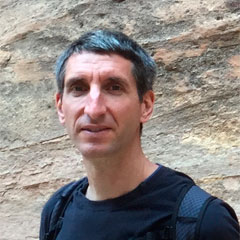 Christian Buchli
Christian Buchli
From: Karolinska University Hospital, Sweden
Visited: Universitair Ziekenhuis Leuven, Belgium under the direction of Prof André D’Hoore
In December 2015 I had the privilege to visit the Coloproctology unit at UZ Leuven under the auspices of Professor André D’Hoore for two weeks. This tertiary referral unit treats patients presenting with the whole spectrum of pathologies in Coloproctology performing proctological procedures in the outpatient clinic to cytoreductive surgery with HIPEC. The unit is internationally renowned for laparoscopic surgery, which gave me the unique opportunity to assist in a broad variety of laparoscopic procedures. I was most impressed by the skilful dissections in the correct anatomical plane and the rational intraoperative decision making exhibited by the surgeons in charge. The highlights were several transanal TMEs, the scope of my visit at Leuven. After two fantastic weeks in Leuven, I had learned a lot, from big procedures to small details within the operating theatre. I have already applied some laparoscopic techniques with success, and we are working hard now to advance our transanal skills at home.
My thanks go to the ESCP for organising and supporting this kind of clinical visit, and creating the possibility for such an experience that will have a profound impact on my future life as surgeon. The warm generosity of Professor André D’Hoore and the entire staff at Leuven enabled a unique and realistic insight in an academic unit at the leading-edge of Coloproctology. Last but not least, I would like to thank Professor Per Nilsson, head of my department at Karolinska, for encouraging and supporting this observership.
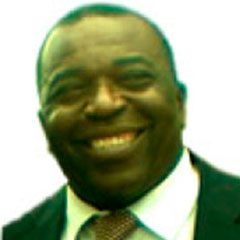 Elroy Patrick Weledji
Elroy Patrick Weledji
From: Department of Surgery, Faculty of Health Sciences, University of Buea; Regional Hospital, Buea, Cameroon
Visited: Kantonsspital, St. Gallen, Switzerland, under the direction Dr Lukas Marti
I would like to express my gratitude to ESCP and Medtronic for offering me a clinical observership in pelvic floor surgery at a center of excellence in Europe, St Gallen Switzerland. I am the first non-European member of ESCP from Cameroon, West Africa and it was thus a great privilege to spend a month at the Coloproctology unit of St Gallen. I was supervised by the dedicated Dr Lukas Marti who ran the pelvic floor unit and the dynamic Dr Walter Brunner who led the colorectal cancer section. The collaboration and team work in the unit was remarkable.
The pelvic floor unit was well-equipped for instant assessment with endoanal manometry and endosonography of anorectal disorders including anal sepsis and fistulas. I observed the indications, applications and outcome of four sacral nerve stimulation (SNS) and two posterior tibial nerve stimulation ( PTN) procedures all sponsored by Medtronic. The importance of circumferential perianal biopsies of suspicious premalignant, intraepithelial neoplasia and Paget’s was well appreciated. The European school of thought, which prefers a more conservative approach in the treatment of anal fissure by simple fissurectomy with botox injection, and thus avoids the risk of a permanent internal sphincter damage, was appreciated.
Within a month I was very fortunate to observe several state-of the art sessions on transanal TME of rectal cancer demonstrated by Dr Brunner and Dr Marti to international visitors. This will definitely be the future for the surgical management of rectal cancer with respect to the minimally invasive approach without oncological compromise. Being a center of excellence with prominent surgeons, I took the opportunity to observe robotic-assisted colon resections by the Head of Surgery - Prof B. Schmied - robotic resections of a superior mediastinal parathyroid adenoma, thyroid adenoma and prostate cancer.
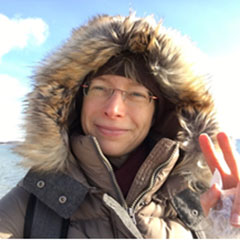 Gabriele Böhm
Gabriele Böhm
From: Marienhospital Aachen, Teaching Hospital of RWTH University Hospital Aachen
Visited: Aarhus University Hospital under the direction of Professor Søren Laurberg
I wish to express my profoundest thanks to the ESCP for giving me this great opportunity to visit the highly specialised colorectal unit at Aarhus University Hospital. The hospital handles large case numbers in nearly every colorectal subspecialty, and also has a very dedicated pelvic floor unit.
I would like to thank Prof Søren Laurberg for kindly hosting me and providing me with an insight into the daily practise of his unit, and the opportunity to get to know his wonderful surgical team. I was very happy to receive a warm welcome by every member of his unit.
During the first week I attended the advanced rectal cancer cases including Extralevator resections and VRAM reconstructions, HIPEC and pelvic exenterations. I was able to assist highly qualified surgeons at work. The opportunity to see laparoscopic, open as well as robotic TMEs, was great.
At the end of the second week of observing IBD cases, there was a two day in-house prolapse surgery meeting with the visiting Professor André D’Hoore from Leuven Belgium. The department operated 9 patients with rectal prolapse, laparoscopic as well as robotic. I felt that this meeting was a very good model and allowed for lively discussions.
Aarhus as a city offers a lot of wonderful sightseeing as well as nearby nature trails. During my observership, we went out one evening to a modern Danish restaurant with excellent food and German Riesling Wine. It was a very enjoyable experience, and I wish to pass on my sincere thanks again for this opportunity.
During my third and final week I concentrated on the Anophysiology Clinic and its procedures: Sacral nerve stimulation, Sphincteraugmentation, Fat Stemcell Injection for anal fistula and a.o. The team working with Lilli Lundby are very proud of their achievements in running a nurse-led evaluation and follow up clinic.
To summarise, the ESCP oberservership was a very worthwhile personal experience, and allowed me to advance my surgical knowledge within a great team.
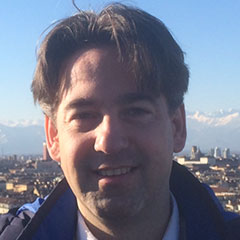 Edgar Furnee
Edgar Furnee
From: Diakonessenhuis Utrecht, The Netherlands
Visited: Aarhus University under the direction of directed by Professor Søren Laurberg
I was very fortunate to have been awarded a prestigious 3 months ESCP fellowship at Aarhus University Hospital, Denmark. I have chosen this colorectal unit as I was able to focus on areas within the field of colorectal surgery that I had relatively limited experience, and because of the excellent experiences reported from previous ESCP fellows. As I was mainly focussed on laparoscopic colorectal surgery and Inflammatory Bowel Disease during both my training in The Netherlands and electives in the UK and Italy, my primary goal of the fellowship was to expand my knowledge and improve my skills within the areas of proctology, pelvic floor surgery and advanced colorectal cancer surgery.
The fellowship was an extremely 'hands-on' experience with a wide variety of colorectal procedures. As this unit is a regional and national referral centre for perianal fistula, I was exposed to a high volume of surgical treatments for exceptionally advanced perianal and rectovaginal fistula, including LIFT, fistulotomy with primary sphincter reconstruction and stem cell treatment. I was also able to practise endoanal ultrasonography in these patients. Additionally, this unit is very well organized for patients with functional problems, including high-quality level nurse-led clinics offering a wide range of individualised conservative treatments. For patients with more advanced diseases, I had the opportunity to perform sacral nerve stimulation for faecal incontinence, (3D) laparoscopic rectopexies and Altemeier procedures in patients with external rectal prolapse. I was also delighted that I could perform quite rarely applied procedures like a Malone appendicostomy and Chait catheter in patients with slow transit colon.
Aarhus University Hospital is one of the two referral centres in Denmark for patients with advanced colorectal cancer as well. Due to the large number of patients, I could extensively participate in pelvic exenterations to become familiar with the anatomical planes in this area. In addition, I gained experience with the different types of abdominoperineal excisions as I had the opportunity to do the dissection of the lower rectum during the perineal phase in several rectal resections. Furthermore, I was able to learn technical aspects of HIPEC procedures and I was also involved in robotic surgery for rectal cancer. Since all surgeons were very willing to discuss different aspects of the operative techniques, the surgical procedures used in this unit were highly instructive to me.
I have really enjoyed my ESCP fellowship at Aarhus University. It was absolutely an excellent experience and a tremendous privilege to have the opportunity to be exposed to the high level of surgical expertise at this unit. This fellowship has been of great additional value to me and will enable me to improve the quality of my own clinical practise. I would like to thank the extremely friendly staff of this unit for this unforgettable experience and I am also very grateful the Education Committee of the Society for offering me this great opportunity.
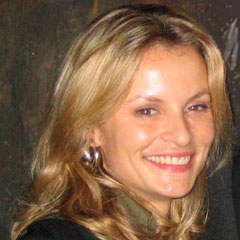 Jelena Petrovic
Jelena Petrovic
From: University Hospital for Digestive Surgery, First Surgical Clinic, Clinical Center of Serbia
Visited: Geneva University Hospital, Switzerland, under the supervision of Prof Bruno Roche and Dr Frederic Ris
In 2015 I was fortunate enough to be granted a three- month scholarship in laparoscopic surgery that was conducted from October till December at The Geneva University Hospital.
The Geneva University Hospital is the biggest healthcare institution in Geneva Canton, at a disposal to almost
half a million of inhabitants. It is very well equipped and organized, and its reputation brings people from many other countries in search of adequate treatment for rare and complex conditions. Professor Roche work represents state of the art in diagnostics and treatment of pelvic floor disorders both in laparoscopic and perineal approach, combining office day, ambulatory/one day and inpatient approach with careful selection and treatment tailoring.
Under the mentorship of Dr Ris I was introduced, step by step, into the world of laparoscopic colorectal surgery. Under his patient and thorough approach and his friendly attitude, my involvement included much more than just camera handling and observation, but also an active role in tissue dissection and organ division. I have learned to broaden my views on patient suitability for laparoscopy, my surgical skills improved and I have already successfully applied them in my practice. I also had a pleasure of being acquainted with basics of the robotic surgery.
I am very grateful to ESCP and Fellowship sponsor companies for their support and this fantastic opportunity. Prof. Bruno Roche and Dr Frederic Ris were very friendly, but also professional mentors, and I can warmly recommend their team and Geneva University Hospital as a supreme educational and modern training center.
Manol Sokolov
From: Medical University, Sofia, Bulgaria
Visited: Kantonsspital, St. Gallen, Switzerland, under the supervision of Dr Lucas Marty and Dr Walter Brunner
I had the exceptional opportunity and pleasure to spend three months training time from January to March 2016 in the coloproctology unit of the department of surgery at Kantonsspital St. Gallen, Switzerland - KSSG. It is an amazing place, the town and the hospital are incredible. All you know how beautiful the Switzerland is. I found myself in a great hospital with a perfect round-the-clock work organization and very high level of medical equipment and highly qualified specialists. I was supported logistically with my accommodation by the administrative staff even before my arrival.
My immediate mentors were Dr. Lucas Marty and Dr. Walter Brunner. They formed my surgical identity in many aspects.
On the day of my appearance in the clinic I felt warm and collegial attitude of the entire medical staff. I was immediately involved in daily clinical work of the department of surgery. The everyday morning meetings were always accompanied by a scientific presentations dedicated to a particular surgical nosological problems and followed with considerable interactive scientific discussion at extremely high level.
Even on my first day in the OR I observed “down-to-up”- TaTME in case of ultra-low anterior resection of the rectum performed by Dr. Brunner and Dr. Marty. In the following months I had the good fortune to observe and participate in more than 20 such procedures.
It was joy for me that the imposed clinical practice in the surgical department and coloproctological unit is working with high-tech equipment and instruments and performing mainly laparoscopic minimally invasive surgery.
I was able to use HD 3D optics for the first time in my work. I've had the full course simulator exercises with third-generation robot and I participated in several robot-assisted operations - resections of the colon and rectum, surgery for prolapse of the rectum - ventral recto- colpopexy.
I was taking an active part in various proctological operating procedures for hemorrhoids - conventional, using a high-energy devices, Longo - PPH; perianal fistulas with advancement flap and LIFT-technique, anal sphincter reconstruction, STARR with a Contour Transtar stapler in prolapse, Limberg-flap in pilonidal disease treatment, anal intraepithelial neoplasia and condylomata with a laser system. I observed and was involved for the first time in procedures for treatment of fecal incontinence - sacral nerve stimulation (SNS) and surgery for implantation of Continence Restoration System - magnetic sphincter.
I participated weekly in outpatient clinic with detailed interactive discussion of each case with Dr. Marti as well as I was able to participate in organized plenary workshops and tumor board - meetings conducting a real multidisciplinary approach in all oncology cases.
Despite my excellent impressions of the flawless organization of all the activity in OR, what stunned me most were the brilliant surgical skills of my mentors - Dr. Lukas Marty and Dr. Walter Brunner and also of the head of the surgical department Professor. Bruno Schmidt . They are great professionals, highly intelligent and friendly people. I was happy everyday to be a part of their amazing surgical team with all those various conventional and mini-invasive surgeries contained into the domain of the great surgery. I've being learned on various professional Tips and Tricks during every surgical procedure. It was particularly important the possibility of free discussions on specific surgical techniques and cases both during the operation and on the sidelines of the OR, which was extremely helpful to me.
I had the great chance to take part in a practical training course for advanced laparoscopic skills at Davos, Switzerland as a part of the 33rd International Algöver Workshop for Gastrointestinal Surgery with conventional and laparoscopic skills. There I had a laparoscopic colorectal surgery module and laparoscopic hernia repair module, which has gained to me extremely essential practical benefits about my surgical career so far and, I hope, in the future by accumulating more and more experience on that field of practice.
I am extremely grateful to ESCP, especially Professor Klaus Matzel and Ms Nicola Boyle, for the exclusive opportunity I was given to carry out this very genuinely important for me Fellowship.
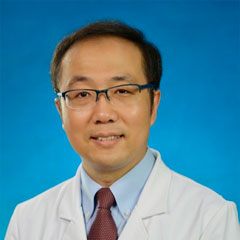 Zhanlong Shen
Zhanlong Shen
From: Department of Gastroenterological Surgery, Peking University People’s Hospital, China.
Visited: St Mark’s Hospital, London, UK, under the direction of Miss Carolynne Vaizey
I am grateful to the European Society of Coloproctology and to Ethicon and Medtronic, who offered me a great opportunity to experience and observe as a surgeon in a British hospital for one month. From visiting St Mark’s Hospital, I not only gained knowledge and techniques but also got to know the medical system in the UK. Indeed, this programme give us an opportunity to learn from each other both in surgery and in culture between UK and China.
During my observership at St Mark’s, my director, Miss Carolynne Vaizey, was very kind and took great care of me. I observed several of her operations for complicated Crohn’s disease and MDT discussion. She also kindly recommended other professors who practice colorectal cancer surgery, including Professor Kennedy, Mr Jenkins and Mr Warusavitarne. They showed me great technique in laparoscopy with clear anatomical dissection. I was so impressed by right hemicolectomy by Professor Kennedy, and have brought back some of his tips on this technique. I have also changed my style of lymphadenectomy since returning to my hospital. I also now know Mr Warusavitarne well, because we are both interested in taTME. I had several cases and experience in taTME before I visited the UK, so we had great discussion and exchanged ideas about this technique. I recommend all young colorectal surgeons to visit St Mark’s - thank you for the opportunity.
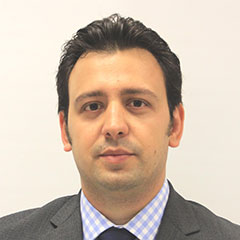 Emre Sivrikoz
Emre Sivrikoz
From: Okmeydani Training and Research Hospital, Turkey
Visited: St Mark's Hospital, London under the direction of Miss Carolynne Vaizey
I visited St Mark's Hospital for a six month period under the auspices of Miss Carolynne Vaizey. As is well known, St Mark's has been at the forefront of colorectal surgery since it was founded by the pioneering surgeon Frederick Salmon. Throughout the decades it has evolved to become a leading centre leaving its mark on areas ranging from fistula classification to colorectal cancer staging, from faecal incontinence to pouch surgery. Throughout my fellowship, Miss Vaizey was a great tutor and very supportive. Indeed, before I began my fellowship, I pictured St Mark's as a gold standard in the colorectal field, and my experience only served to fulfil my expectations in advancing my understanding and knowledge in all aspects of colorectal surgery. I have been introduced to the concept of intestinal failure and its multidisciplinary management by Miss Vaizey. I was most impressed by the step-by-step approach in laparoscopic surgery and meticulous dissections of CME by Prof Robin Kennedy. The state-of-the-art technology was fully embraced by Mr Janindra Warusavitarne, who was performing proctectomies using two single ports simultaneously with a TaTME approach. It was a unique experience to observe Prof Robin Phillips finding cures to the most sophisticated complex perianal fistulas. I was also able to participate in a number of ongoing research projects. During my fellowship, I also participated in various teaching activities at the institution including the post-graduate teaching term and perianal fistula day.
The fellowship provided me with an excellent opportunity to take a step back and review room for improvements in my own surgical decision making. I now feel more confident within the specialty and I am ready to embrace the challenges that lie ahead in surgical practice and academic study. I wish to express my deep gratitude towards ESCP for providing me with such a great opportunity.
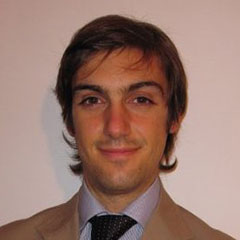 Gianluca Pellino
Gianluca Pellino
From: Unit of Colorectal Surgery, Second University of Naples, Italy
Visited: Royal Marsden Hospital, and the Department of Surgery and Cancer, Imperial College, London, under the direction of Professor Paris Tekkis
I am extremely grateful to ESCP for providing me with such an invaluable experience.
I was awarded a six month fellowship at one of the world renowned centres in the treatment of colorectal cancer, the Royal Marsden and Department of Surgery and Cancer at Imperial College, London. This was one of the first six month fellowship offered by the Society, and was the first to involve robotic surgery as well.
During my fellowship at the Royal Marsden, I had the opportunity to work with the latest DaVinci System for Robotic surgery available, the Xi platform, as well as Si DaVinci. Professor Paris Tekkis supervised me throughout my robotic colorectal training, which included online courses and modules, and in time, experience with the simulator. This knowledge and acquired skills enabled me to assist in robotic operations during my fellowship.
Throughout my fellowship I was also able to observe and assist in other complex colorectal procedures, such as pelvic exenterations, sacrectomies, and extralevator abdominoperineal resections. I was also involved in MDT meetings at the pelvic floor physiology lab. At the same time, I had the chance to follow-up the patients on the wards, at the outpatient clinic department and at the endoscopy suite.
Indeed, the experience provided me with adequate knowledge and information concerning both the benefits and shortcomings of robotic surgery in colorectal cancer patients, and to identify those patients who it may be suitable for and will benefit from this approach.
In addition to surgical practise, I also had the unique chance to taking part to research projects as well, and was able to collaborate with the renowned scientists in the field.
I wish to thank my mentor Professor Selvaggi for allowing me to spend six months away in London. I feel that I have learnt much during these months, and the experience will definitely improve my future surgical practice. This would have not been possible without the incredible effort of Professor Tekkis and the impressive teamwork put in every day of surgical practice. Every member of the team looks after patients with meticulous attention to detail, never forgetting the humanity and social component of patient care, which I feel makes the Royal Marsden a unique cancer centre. I felt part of the team from my very first day spent at the centre. I will always be grateful to Professor Tekkis for hosting and guiding me, and I need to thank from my heart all the members of his team, especially Mr. Shahnawaz Rasheed and Mr. Christos Kontovounisios. They are indeed top-level surgeons and as well as extraordinary people.